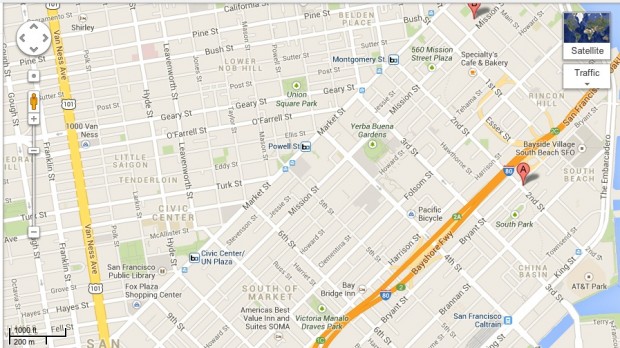
5 Search-Savvy Secrets to Google Map Listings
A potential customer is looking for a brick-and-mortar business like yours, but you’ve got just a fraction of the marketing budget of that big-box competitor to reach them. Luckily, Google has helped level the playing field with Google map listings, at least as far as search results go. But if you want to pop up online when customers are searching for you nearby, you need to be SEO-savvy, popular with your customers and consistent across a slew of networks, sites and platforms.
That’s easier for a small marketer than it sounds, however, Allison Nuanes, local marketing manager at digital ad agency Booyah Online Advertising, says small location-based businesses have a built-in advantage these days: someone searching Google doesn’t even have to type in their city or state for Google’s search algorithm to trigger a local result for terms like “restaurant.”
“Even if you aren’t searching for ‘Denver,’ [Google maps will] infer that there’s local intent and start giving you results for restaurants nearest you,” points out Nuanes. Since results are triggered by geography based on the proximity of the person to your store or restaurant, this makes it easier for people close by to find you, meaning that you can compete with the big chain that’s five minutes further down the road.
In addition to a location advantage, more reviews of your business from happy customers can easily push you ahead of your competitors, says Nuanes. And because small businesses tend to focus on just one location (as opposed to multiple locations), you can have a bit of an edge. Here are five simple tips for making sure your Google map listing is working for you.
Tip #1: Integrate Google+ for better results
Google’s algorithm integrates Google+ into local results, so make sure to claim your Google+ listing, and that all of the categories are checked off correctly. (Check out our guide for getting started with Google+).
Tip #2: Make sure your address is consistent.
If Google displays your address with S. in front of the main street instead of South, keep it that way. “The way Google decides to display your address is the way you should do it in every other site if possible, including your website,” Nuanes explains. Consistent listings can help your biz appear higher on search engine results.
Tip #3: Claim or verify your business on other sites, too.
Foursquare and Yelp are clearly frontrunners, but “I would definitely also do Yahoo! and Bing as well,” Nuanes says. “Yahoo! Local and Bing Local have their own platforms now. They have smaller numbers, but still quite a lot of people who use them. Bing’s map is feeding into Apple now for iPad and iPhones, and Yelp is also feeding into Apple systems for mobile search results, so it’s really important to hit all those big platforms.” Simply verify the listings or claim your business on all four sites to get started.
Tip #4: Seek engagement from your customers.
“Once you have claimed your business in all of those different places, take it to the next level by talking to your customers and putting up signs reminding them to check in on Foursquare, Facebook and Yelp,” Nuanes recommends. “Remind people to post reviews if they’re happy customers, whether that’s through signage, email footers, or talking to employees in your store to remind them to talk to customers.” A large number of positive reviews and check-ins help boost your search engine ranking.
Tip #5: Be careful not to cross the line.
Don’t pay for reviews or incentivize them with prizes. “When Yelp has found out that someone is paying for reviews on Craigslist, or finding elite Yelpers and asking for reviews, they will completely remove the business from their site and put up a big sign saying that the business has paid for reviews. There are pretty big consequences for them,” Nuanes explains.
What’s next?
The biggest development in location-based apps is that Foursquare will be rolling out some advertising for small businesses. If someone checks into a bar, for example, a specific liquor brand can advertise to that user. In addition, Foursquare is rolling out ads to connect people looking for somewhere to go with businesses that want to drive foot traffic to their locations. Businesses will pay when people visit the listing on Foursquare or their location in person. These programs are still in the pilot phase, but businesses can sign up on Foursquare to get information as it becomes available.
Bottom line
The best way to compete with big businesses is to make sure your business profiles are claimed, your information is consistent and up-to-date, your listings are relevant and your customers are engaged. It doesn’t matter as much whether they check in on Foursquare or on Facebook, as long as they’re checking in with you. And getting good reviews from happy customers is always helpful, whether they’re posted on Yelp or Foursquare or Google or Facebook. That means you can outdraw your competition, no matter how big.
How are your Google map listings working for you? Share away in the comments!
This post contributed by guest author, Yael Grauer. Grauer is a Minneapolis-based freelance writer and editor. Find her online at Yaelwrites.com.
© 2013 – 2018, Contributing Author. All rights reserved.




Hi Josh!
I did some research, and Google provides some support about editing your business info including your “introduction,” aka business description, etc. Check this and see if it helps: https://support.google.com/business/answer/3039617?hl=en
Cheers,
Colleen
Hello,
I am having trouble adding a description of my store on my Google maps listing. My primary category shows as well as my reviews, but it is missing the one line below all that.
Can you help?
Thanks